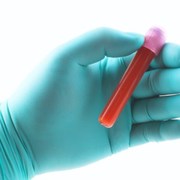 Photo: Getty Images
Photo: Getty Images
Scientists have discovered that fetal DNA is present in the mother’s blood stream, which means that it is possible to blood test mothers in order to detect genetic abnormalities in their babies. With that knowledge, researchers from Greece, Cyprus and the UK have developed a blood test that can accurately detect Down syndrome in developing babies.
There are currently blood tests available that detect biomarkers for Down syndrome but these only estimate the likelihood of the disorder and cannot say definitely whether the baby has Down syndrome.
The Combined Test
The combined test, given between 11 to 14 weeks of pregnancy, consists of a blood test that checks for pregnancy-associated plasma protein, which is produced by the placenta. In pregnancies with Down syndrome babies, the level of these proteins is reduced. The test also checks for beta human chorionic gonadotrophin (beta hCG), which is present in raised amounts in affected pregnancies.
A Nuchal translucency scan will also be given, which is an ultrasound scan to check the amount of fluid present under the skin on the back of the baby’s neck. It is normal to have some fluid, but in Down syndrome babies, this amount is increased. This combined test can estimate the risk of your baby having the condition but it can’t actually tell you whether he or she has it or not.
CVS and Amniocentesis
If the combined test results show an increased risk, you will be offered either a chorionic villus sampling (CVS) test, where a sample of the placenta is taken for genetic testing, or an amniocentesis, where a sample of amniotic fluid is taken. These tests can provide a definite answer on whether your baby has Down syndrome but they are invasive and carry a risk of miscarriage.
For CVS the risk of miscarriage is two in every 100 pregnancies and for amniocentesis the risk is around one in 100. Other estimates say the risk is slightly lower but because of the risk, some pregnant women don’t want to have these tests.
Less Invasive Blood Test
The new genetic blood test offers a way of screening your baby for Down syndrome without putting him at risk.
The researchers looked at blood from 40 women, 20 of whom were carrying genetically normal babies and the other 20 were carrying babies with Down syndrome. They were not told which blood sample came from which woman. Using their new genetic test, they were able to correctly identify whether the babies were affected or not.
In a second sample group of women whose babies hadn’t undergone diagnostic testing they also correctly identified 26 normal pregnancies and 14 Down syndrome pregnancies, showing their test to be 100 percent accurate.
The National Health Service (NHS) in the UK wrote:
"It seems feasible that at some point in the future, pregnant women could be offered a blood test that can diagnose certain genetic disorders without the need for invasive testing."
Sources:
New blood test for Down’s syndrome? NHS Choices. Web. 23 October 2011. http://www.nhs.uk/news/2011/03March/Pages/blood-test-for-downs-syndrome-studied.aspx
Chorionic villus sampling (CVS) and amniocentesis information for health professionals, NHS Leaflet. Web. 23 October 2011. http://fetalanomaly.screening.nhs.uk/publicationsandleaflets
Antenatal Screening for Down's Syndrome, Patient UK. Web. 23 October 2011. http://www.patient.co.uk/doctor/Antenatal-Screening-for-Down%27s-Syndrome.htm
Fetal-specific DNA methylation ratio permits noninvasive prenatal diagnosis of trisomy 21, Nature Medicine 17,510–513 (2011). Abstract: http://www.nature.com/nm/journal/v17/n4/abs/nm.2312.html
Joanna is a freelance health writer for The Mother magazine and Suite 101 with a column on infertility, http://infertility.suite101.com/. She is author of the book, 'Breast Milk: A Natural Immunisation,' and co-author of an educational resource on disabled parenting.
She is a disabled mother of five who practised drug-free home birth, delayed cord clamping, full term breast feeding, co-sleeping, home schooling and flexi schooling and is an advocate of raising children on organic food.
Reviewed October 24, 2011
by Michele Blacksberg RN
Edited by Malu Banuelos





Add a Comment1 Comments
I always check out this website before buying any products in pregnancy - http://www.pregnancyhelper.net this is my personal favourite product because I got results in a very short time
October 24, 2011 - 7:37pmThis Comment